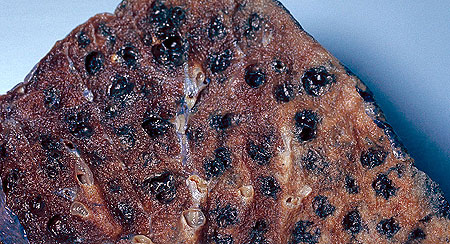Emphysema is a long-term, progressive disease of the lung(s) and occurs when the alveolar walls are destroyed along with the capillary blood vessels that run within them. This lessens the total area within the lung where blood and air can come together, limiting the potential for oxygen and carbon dioxide transfer.


Emphysema is a long-term, progressive disease of the lung(s) and occurs when the alveolar walls are destroyed along with the capillary blood vessels that run within them. This lessens the total area within the lung where blood and air can come together, limiting the potential for oxygen and carbon dioxide transfer.
In early emphysema, there is associated inflammation of the small airways or bronchioles that limits the amount of air that can flow to the alveoli. In more severe emphysema, there is also loss of elasticity in the alveolar walls that have not been destroyed. When the patient breathes out, the alveoli and small airways collapse. This makes it hard for air to get out of the lungs and makes it even harder for new air to enter.
As more of the lung is destroyed and the lung cannot maintain oxygen concentrations in the bloodstream, the body compensates by gradually increasing the breathing rate. After a while, even hyperventilation (hyper=more + ventilation=breathing) cannot maintain adequate oxygen levels, and the arteries in the lung begin to constrict or narrow.
The heart has to work harder to push blood into these narrower blood vessels, causing the blood pressure in the lung arteries to increase (pulmonary hypertension). Over time, the extra work requirement causes the heart muscle to enlarge (hypertrophy) and can cause heart failure.
The main cause of emphysema is smoking, which activates inflammatory cells in the lung. This inflammation causes; 1) swelling within the bronchioles, and 2) activation of enzymes called proteases which attack and destroy lung tissue (the alveolar wall structures).
Emphysema is also a component of aging. As the lungs get older, the elastic properties decrease, and the tensions that develop can result in small areas of emphysema.
Emphysema is a progressive disease that usually manifests itself in patients after 50 years of age. Emphysema is a subtype of chronic obstructive pulmonary disease (COPD in the US, COLD in the United Kingdom). Most patients, except in those in whom disease is the result of a genetic deficiency (alpha-1 antitrypsin deficiency), have variable manifestations of the different components of COPD which include: chronic bronchitis, asthma, emphysema, and bronchiectasis.
How is emphysema diagnosed?
As is the case with most illnesses, the healthcare provider will take a careful history to learn about the lung and breathing symptoms.
How long has the shortness of breath been present? What makes it better? What makes it worse?
Has there been an infection recently? Have the symptoms been getting more severe? Does the patient smoke? Does the patient have exposure to secondhand smoke or other toxic fumes? Is there a family history of lung disease?
Physical examination will concentrate on the lung findings, but may also include the heart and the circulatory system.
Listening to the lungs, are there wheezes present, especially if the patient is asked to exhale quickly?
Emphysema is not a curable disease, once lung damage has occurred it cannot be reversed. The goal of treatment is to stop further lung destruction and preserve lung function. The patient needs to know that the focus is on improving quality of life and limiting the intrusion of emphysema on daily activities.
The number one treatment goal is to have the patient stop smoking. Education, counseling, support groups and medication may be used.
To those who are facing the problem right now it is not that easy, Barbara Chebet 49- old year at Cheptais in Bungoma Kenya shares her experience.
"I was diagnosed with emphysema two years ago. I took another year and a half to quit smoking. Last week I had to be flown out to another hospital for respiratory failure. After a week of kicking myself for not quitting sooner my new doctor informed me that I had a rare form of genetic emphysema and would have gotten it anyway.
"He thought that the information would make things better and maybe it should, but now all I think about is that my kids now have this to look out for as well. I had a heart attack at 39 and found out about genetic heart disease then.
"Wish I could just say to the kids that I messed up and to learn from my mistakes. What is to learn? They all are dealing with this in their own ways but I have to agree with my oldest.”
For those who smoke currently it may seem a story but remember that emphysema is real, try slowly by slowly to reduce the rate at which you smoke. But above all bear in mind that "you can do everything through Him who gives you strength” Philippians 4:13.
Compiled by Moses Kirui


